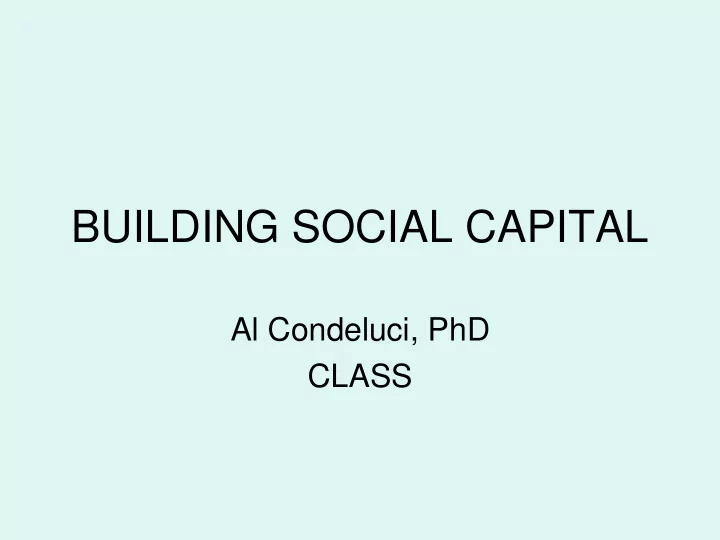

BUILDING SOCIAL CAPITAL Al Condeluci, PhD CLASS
Social Capital refers to relationships we develop and grow within the context of the various communities we join or associate with. What makes these relationships unique are that they support or prop us up in areas we are not strong or capable
Interdependence Social Capital relate to a broader concept of Interdependence. All people have strengths and weaknesses – Interdependence is when we use our strengths to build relationships that help support our weaknesses.
Social Capital is also related to: • Tolerance • Honesty • Kindness • Compassion • Fairness • Integrity • Forgiveness
Finally, Social Capital assists with: • People getting jobs • People keeping jobs (getting along) • Getting around in the community • Finding places to live • Receiving food, other needed supports • Keeping psychologically stable
What is Social Capital? It is nothing more than relationships and friendships that people have in their lives. The natural supports that you have to make your live better.
Social Capital represents the resources available to individuals through their social affiliations and membership in community organizations. It refers to aspects of social relationships that act as resources for individuals and facilitate collective action for mutual benefit.
“If you belong to no groups and decide to join one, you cut your risk of dying in half over the next year” Robert Putnam
Major Domains in Relationships • Acquaintanceships – people we know • Friendships – People we do things with • Covenant – People we love
Bridging Social Capital • This is when connect with people who are essentially different from us, but we have some affinity that creates a bridge that we use to relate. These relationships grow us because we begin to accept differences through the security of the affinity that started the connection.
Bonding Social Capital • These are the relationships that we have a strong connection of similarity. When this strong identity causes us to relate easily and quickly. These commonalities can be ethnicity, religion, age, experience and other factors that make us similar This basic identification creates an easy empathy and sympathy and sense of security.
Clusters of Connection • Family • Neighborhood • Religious • School • Work • Clubs, Groups, Associations • Political Parties
Building Social Capital and Natural Supports • In order to build social capital you must be active (or at least present) in various clusters or communities.
4 Steps to Social Capital • Identify our key areas of interest/affinities • Find the matching cluster or community • Understand how communities behave • Finding a gatekeeper to acceptance
Identifying Affinities • Passions • Hopes • Skills • Talents • Interests • Capacities • Fantasies
Finding the Matching Group • Newspaper • Television • Yellow Pages • Internet – www.meetup.com • Other social networking web sites • Ask others • Observe
How Communities Behave • Expectations • Rituals • Patterns • Jargon • Memory (history)
Find the Gatekeeper • Observe • Ask • Introduce • Support
Gatekeeper Is someone who is natural to the community who has some influence on others. They might be formal, or informal leaders who set the tone for what others do in the community.
Types of Gatekeepers • Proactive – people who are open and reach out to others • Reactive – people who are closed and see others difference and problems
Image Juxtaposition When the image of something positive, after positioned next to something negative, devalued, or new to a community, creates a positive effect on that new thing. This rise in value can happen with ideas, products, or people.
The magic of community is when similarity overrides difference an creates a bond. Through this bond people begin to help each other and that synergy creates an upward effect for everyone involved.
We must find ways to meet or to match people with gatekeepers in community – and – we must become gatekeepers in our own communities!
“We must become the change we hope to create.” • Gandhi
In the end, building Social Capital requires: • Kindness • Hospitality • Generosity • Compassion • Forgiveness
“Either you are kind, or you’re not.” Gianna Condeluci
Al Condeluci, PhD. CLASS 1400 South Braddock Ave Pittsburgh, PA 15218 412-683-7100 x 2122 acondeluci@classcommunity.org www.alcondeluci.com
Recommend
More recommend